Healthy Aging: Ethical and Legal Issues, Interdisciplinary Approach
VerifiedAdded on 2022/11/26
|13
|3398
|370
Essay
AI Summary
This essay delves into the multifaceted aspects of healthy aging, examining the legal and ethical issues that arise when caring for elderly patients with chronic illnesses, particularly those with Alzheimer's disease. It emphasizes the importance of an interdisciplinary approach to holistic care, highlighting the contributions of various healthcare professionals, alongside the crucial role of self-care strategies for primary caregivers to mitigate burnout. The essay analyzes a case study involving an elderly patient and his wife, exploring decision-making processes, ethical principles like autonomy and beneficence, and the significance of end-of-life care. Furthermore, the document incorporates a personal reflection using Gibbs' reflective cycle, detailing the author's experience with their grandfather's death and how it shaped their commitment to nursing. The reflection explores feelings, evaluations, and analysis of the experience, leading to conclusions about improved care approaches and the importance of family involvement. Finally, the essay underscores the need for comprehensive care plans, including legal, ethical, and self-care considerations to ensure the well-being of both the patient and the caregiver.
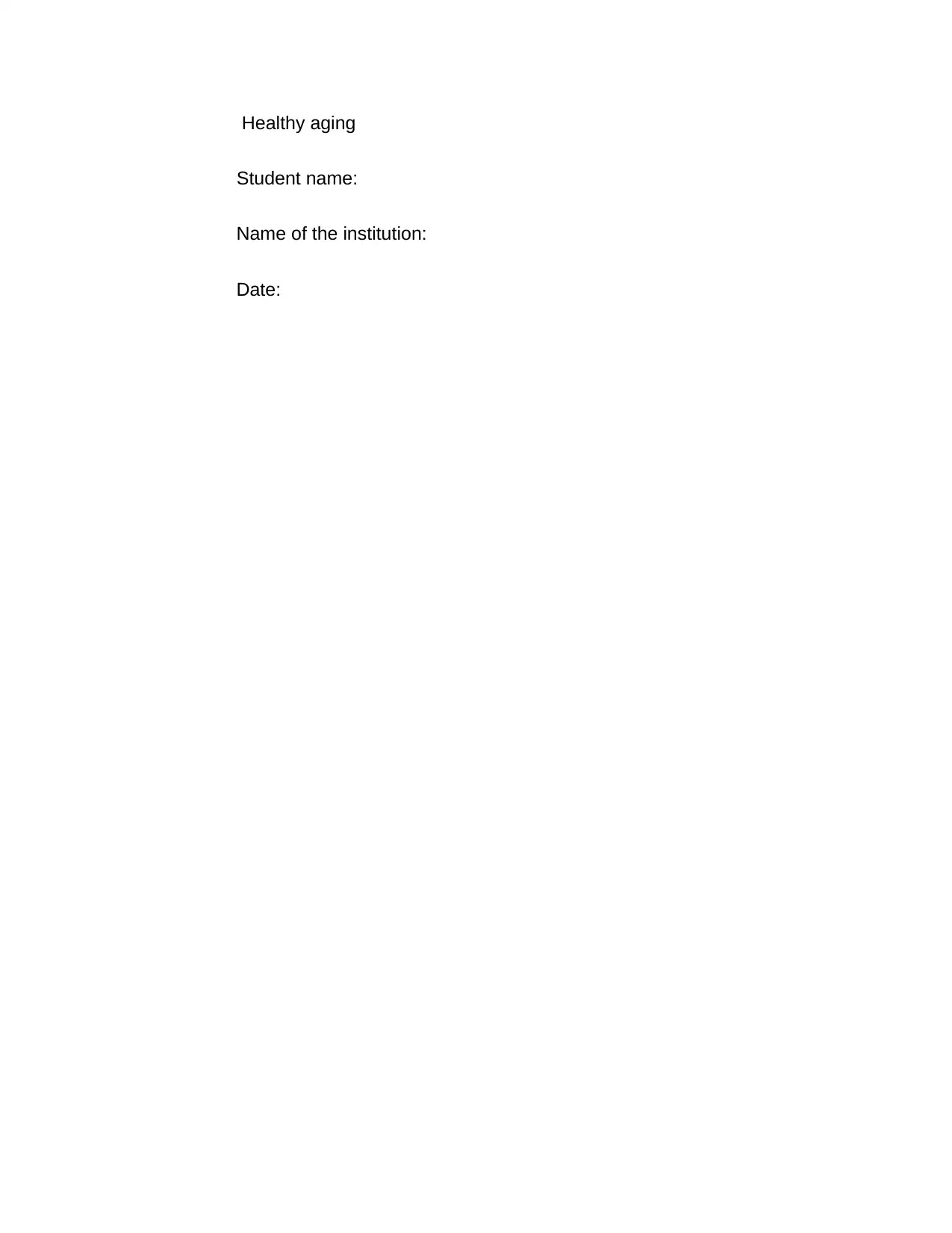
Healthy aging
Student name:
Name of the institution:
Date:
Student name:
Name of the institution:
Date:
Paraphrase This Document
Need a fresh take? Get an instant paraphrase of this document with our AI Paraphraser
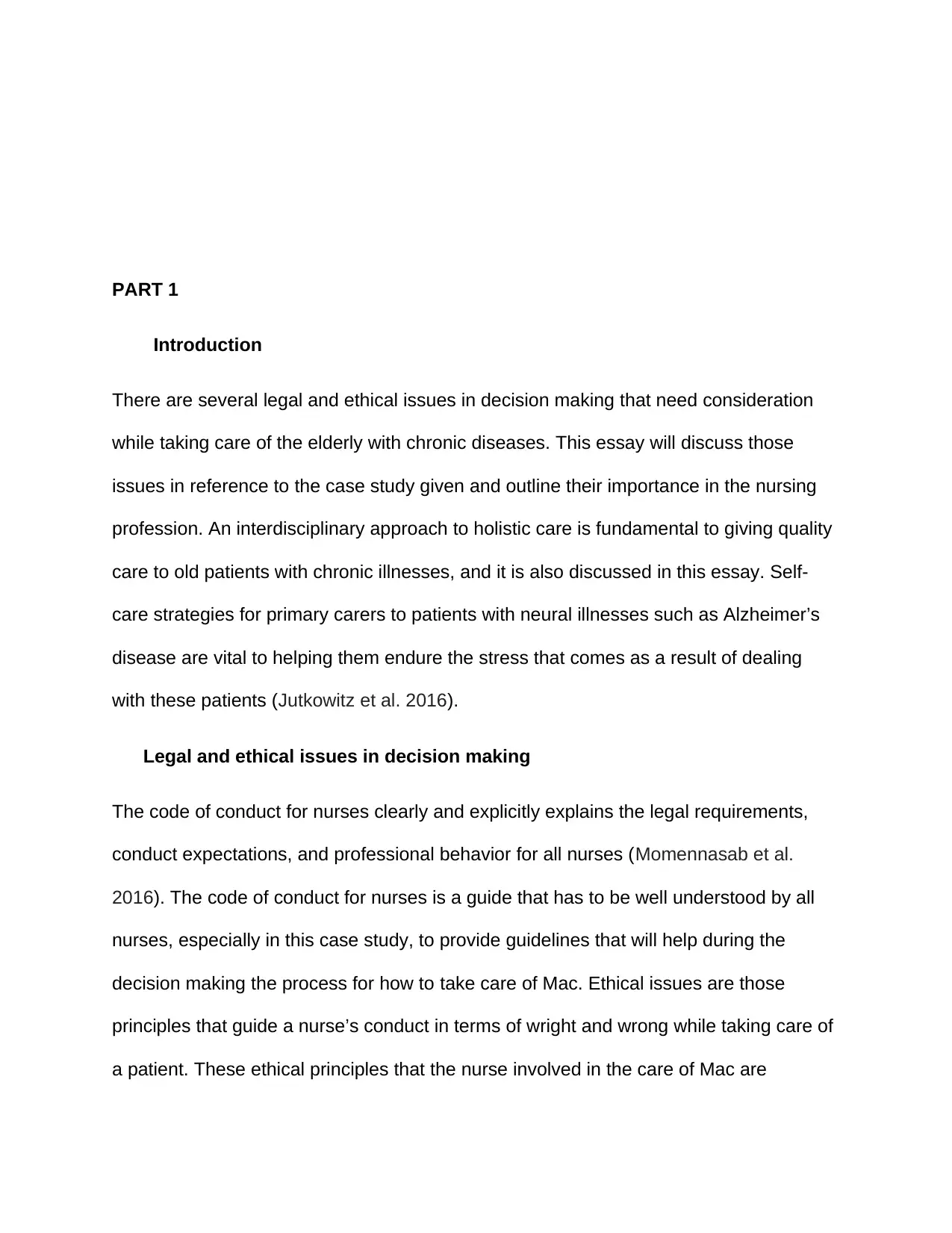
PART 1
Introduction
There are several legal and ethical issues in decision making that need consideration
while taking care of the elderly with chronic diseases. This essay will discuss those
issues in reference to the case study given and outline their importance in the nursing
profession. An interdisciplinary approach to holistic care is fundamental to giving quality
care to old patients with chronic illnesses, and it is also discussed in this essay. Self-
care strategies for primary carers to patients with neural illnesses such as Alzheimer’s
disease are vital to helping them endure the stress that comes as a result of dealing
with these patients (Jutkowitz et al. 2016).
Legal and ethical issues in decision making
The code of conduct for nurses clearly and explicitly explains the legal requirements,
conduct expectations, and professional behavior for all nurses (Momennasab et al.
2016). The code of conduct for nurses is a guide that has to be well understood by all
nurses, especially in this case study, to provide guidelines that will help during the
decision making the process for how to take care of Mac. Ethical issues are those
principles that guide a nurse’s conduct in terms of wright and wrong while taking care of
a patient. These ethical principles that the nurse involved in the care of Mac are
Introduction
There are several legal and ethical issues in decision making that need consideration
while taking care of the elderly with chronic diseases. This essay will discuss those
issues in reference to the case study given and outline their importance in the nursing
profession. An interdisciplinary approach to holistic care is fundamental to giving quality
care to old patients with chronic illnesses, and it is also discussed in this essay. Self-
care strategies for primary carers to patients with neural illnesses such as Alzheimer’s
disease are vital to helping them endure the stress that comes as a result of dealing
with these patients (Jutkowitz et al. 2016).
Legal and ethical issues in decision making
The code of conduct for nurses clearly and explicitly explains the legal requirements,
conduct expectations, and professional behavior for all nurses (Momennasab et al.
2016). The code of conduct for nurses is a guide that has to be well understood by all
nurses, especially in this case study, to provide guidelines that will help during the
decision making the process for how to take care of Mac. Ethical issues are those
principles that guide a nurse’s conduct in terms of wright and wrong while taking care of
a patient. These ethical principles that the nurse involved in the care of Mac are
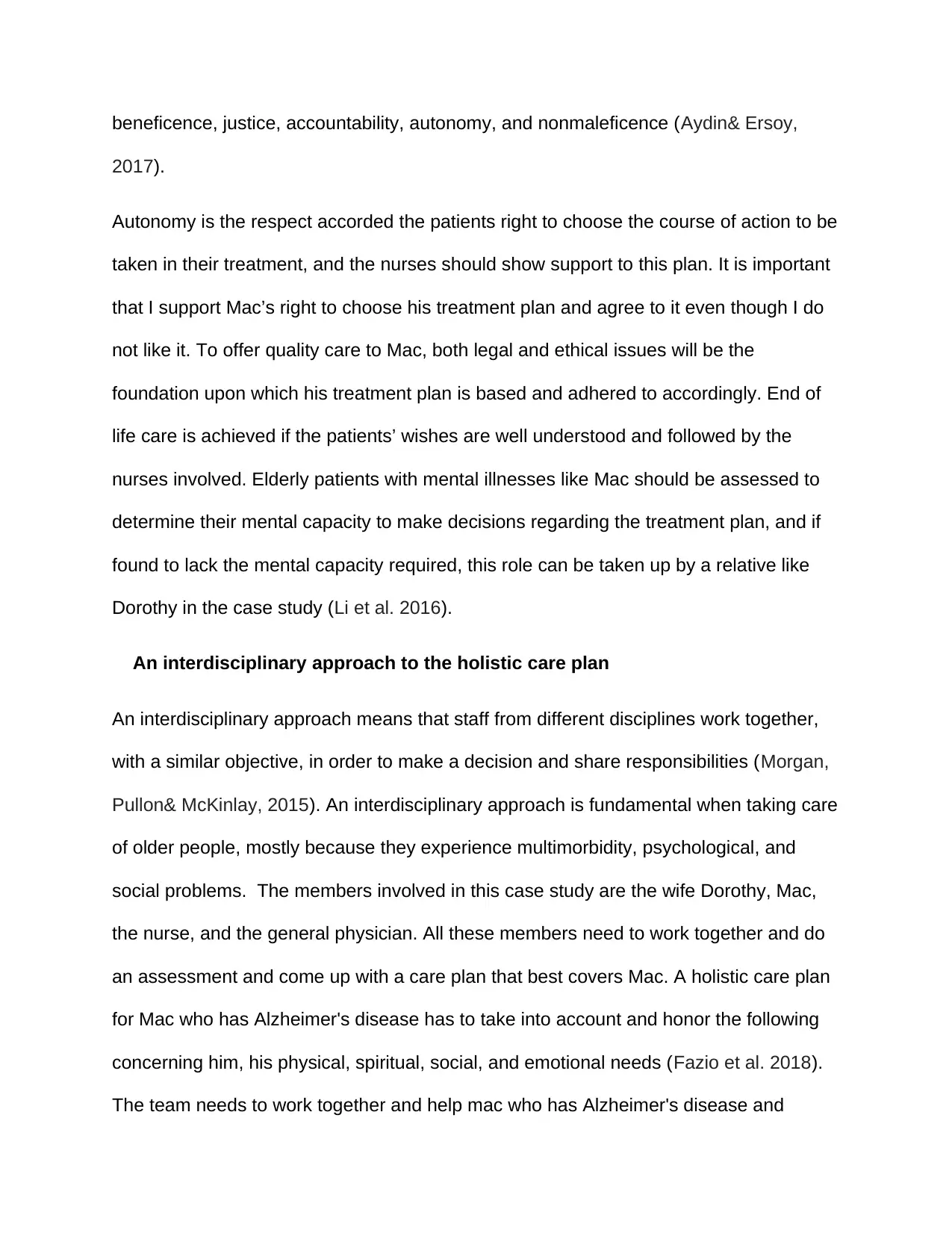
beneficence, justice, accountability, autonomy, and nonmaleficence (Aydin& Ersoy,
2017).
Autonomy is the respect accorded the patients right to choose the course of action to be
taken in their treatment, and the nurses should show support to this plan. It is important
that I support Mac’s right to choose his treatment plan and agree to it even though I do
not like it. To offer quality care to Mac, both legal and ethical issues will be the
foundation upon which his treatment plan is based and adhered to accordingly. End of
life care is achieved if the patients’ wishes are well understood and followed by the
nurses involved. Elderly patients with mental illnesses like Mac should be assessed to
determine their mental capacity to make decisions regarding the treatment plan, and if
found to lack the mental capacity required, this role can be taken up by a relative like
Dorothy in the case study (Li et al. 2016).
An interdisciplinary approach to the holistic care plan
An interdisciplinary approach means that staff from different disciplines work together,
with a similar objective, in order to make a decision and share responsibilities (Morgan,
Pullon& McKinlay, 2015). An interdisciplinary approach is fundamental when taking care
of older people, mostly because they experience multimorbidity, psychological, and
social problems. The members involved in this case study are the wife Dorothy, Mac,
the nurse, and the general physician. All these members need to work together and do
an assessment and come up with a care plan that best covers Mac. A holistic care plan
for Mac who has Alzheimer's disease has to take into account and honor the following
concerning him, his physical, spiritual, social, and emotional needs (Fazio et al. 2018).
The team needs to work together and help mac who has Alzheimer's disease and
2017).
Autonomy is the respect accorded the patients right to choose the course of action to be
taken in their treatment, and the nurses should show support to this plan. It is important
that I support Mac’s right to choose his treatment plan and agree to it even though I do
not like it. To offer quality care to Mac, both legal and ethical issues will be the
foundation upon which his treatment plan is based and adhered to accordingly. End of
life care is achieved if the patients’ wishes are well understood and followed by the
nurses involved. Elderly patients with mental illnesses like Mac should be assessed to
determine their mental capacity to make decisions regarding the treatment plan, and if
found to lack the mental capacity required, this role can be taken up by a relative like
Dorothy in the case study (Li et al. 2016).
An interdisciplinary approach to the holistic care plan
An interdisciplinary approach means that staff from different disciplines work together,
with a similar objective, in order to make a decision and share responsibilities (Morgan,
Pullon& McKinlay, 2015). An interdisciplinary approach is fundamental when taking care
of older people, mostly because they experience multimorbidity, psychological, and
social problems. The members involved in this case study are the wife Dorothy, Mac,
the nurse, and the general physician. All these members need to work together and do
an assessment and come up with a care plan that best covers Mac. A holistic care plan
for Mac who has Alzheimer's disease has to take into account and honor the following
concerning him, his physical, spiritual, social, and emotional needs (Fazio et al. 2018).
The team needs to work together and help mac who has Alzheimer's disease and
⊘ This is a preview!⊘
Do you want full access?
Subscribe today to unlock all pages.

Trusted by 1+ million students worldwide
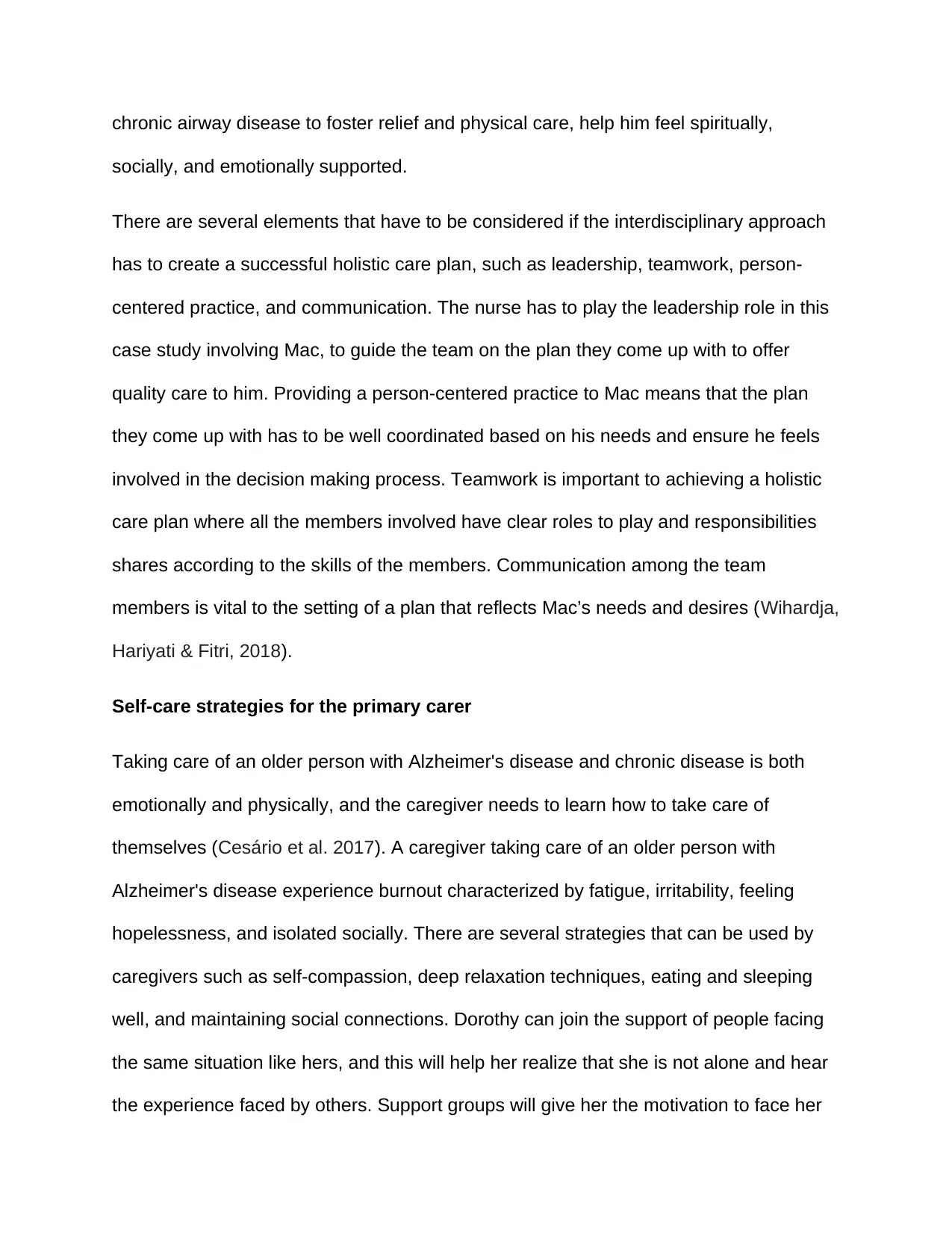
chronic airway disease to foster relief and physical care, help him feel spiritually,
socially, and emotionally supported.
There are several elements that have to be considered if the interdisciplinary approach
has to create a successful holistic care plan, such as leadership, teamwork, person-
centered practice, and communication. The nurse has to play the leadership role in this
case study involving Mac, to guide the team on the plan they come up with to offer
quality care to him. Providing a person-centered practice to Mac means that the plan
they come up with has to be well coordinated based on his needs and ensure he feels
involved in the decision making process. Teamwork is important to achieving a holistic
care plan where all the members involved have clear roles to play and responsibilities
shares according to the skills of the members. Communication among the team
members is vital to the setting of a plan that reflects Mac’s needs and desires (Wihardja,
Hariyati & Fitri, 2018).
Self-care strategies for the primary carer
Taking care of an older person with Alzheimer's disease and chronic disease is both
emotionally and physically, and the caregiver needs to learn how to take care of
themselves (Cesário et al. 2017). A caregiver taking care of an older person with
Alzheimer's disease experience burnout characterized by fatigue, irritability, feeling
hopelessness, and isolated socially. There are several strategies that can be used by
caregivers such as self-compassion, deep relaxation techniques, eating and sleeping
well, and maintaining social connections. Dorothy can join the support of people facing
the same situation like hers, and this will help her realize that she is not alone and hear
the experience faced by others. Support groups will give her the motivation to face her
socially, and emotionally supported.
There are several elements that have to be considered if the interdisciplinary approach
has to create a successful holistic care plan, such as leadership, teamwork, person-
centered practice, and communication. The nurse has to play the leadership role in this
case study involving Mac, to guide the team on the plan they come up with to offer
quality care to him. Providing a person-centered practice to Mac means that the plan
they come up with has to be well coordinated based on his needs and ensure he feels
involved in the decision making process. Teamwork is important to achieving a holistic
care plan where all the members involved have clear roles to play and responsibilities
shares according to the skills of the members. Communication among the team
members is vital to the setting of a plan that reflects Mac’s needs and desires (Wihardja,
Hariyati & Fitri, 2018).
Self-care strategies for the primary carer
Taking care of an older person with Alzheimer's disease and chronic disease is both
emotionally and physically, and the caregiver needs to learn how to take care of
themselves (Cesário et al. 2017). A caregiver taking care of an older person with
Alzheimer's disease experience burnout characterized by fatigue, irritability, feeling
hopelessness, and isolated socially. There are several strategies that can be used by
caregivers such as self-compassion, deep relaxation techniques, eating and sleeping
well, and maintaining social connections. Dorothy can join the support of people facing
the same situation like hers, and this will help her realize that she is not alone and hear
the experience faced by others. Support groups will give her the motivation to face her
Paraphrase This Document
Need a fresh take? Get an instant paraphrase of this document with our AI Paraphraser
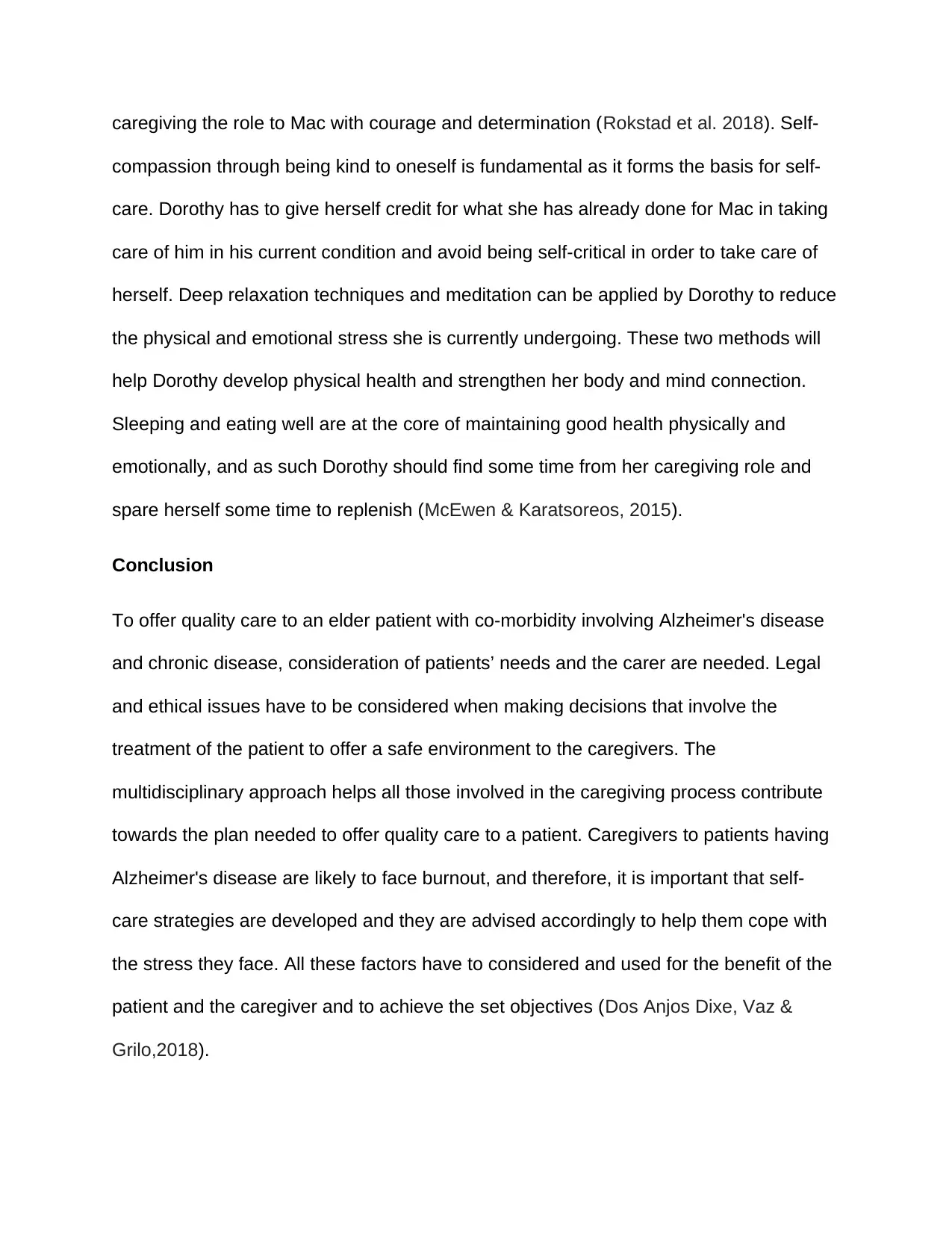
caregiving the role to Mac with courage and determination (Rokstad et al. 2018). Self-
compassion through being kind to oneself is fundamental as it forms the basis for self-
care. Dorothy has to give herself credit for what she has already done for Mac in taking
care of him in his current condition and avoid being self-critical in order to take care of
herself. Deep relaxation techniques and meditation can be applied by Dorothy to reduce
the physical and emotional stress she is currently undergoing. These two methods will
help Dorothy develop physical health and strengthen her body and mind connection.
Sleeping and eating well are at the core of maintaining good health physically and
emotionally, and as such Dorothy should find some time from her caregiving role and
spare herself some time to replenish (McEwen & Karatsoreos, 2015).
Conclusion
To offer quality care to an elder patient with co-morbidity involving Alzheimer's disease
and chronic disease, consideration of patients’ needs and the carer are needed. Legal
and ethical issues have to be considered when making decisions that involve the
treatment of the patient to offer a safe environment to the caregivers. The
multidisciplinary approach helps all those involved in the caregiving process contribute
towards the plan needed to offer quality care to a patient. Caregivers to patients having
Alzheimer's disease are likely to face burnout, and therefore, it is important that self-
care strategies are developed and they are advised accordingly to help them cope with
the stress they face. All these factors have to considered and used for the benefit of the
patient and the caregiver and to achieve the set objectives (Dos Anjos Dixe, Vaz &
Grilo,2018).
compassion through being kind to oneself is fundamental as it forms the basis for self-
care. Dorothy has to give herself credit for what she has already done for Mac in taking
care of him in his current condition and avoid being self-critical in order to take care of
herself. Deep relaxation techniques and meditation can be applied by Dorothy to reduce
the physical and emotional stress she is currently undergoing. These two methods will
help Dorothy develop physical health and strengthen her body and mind connection.
Sleeping and eating well are at the core of maintaining good health physically and
emotionally, and as such Dorothy should find some time from her caregiving role and
spare herself some time to replenish (McEwen & Karatsoreos, 2015).
Conclusion
To offer quality care to an elder patient with co-morbidity involving Alzheimer's disease
and chronic disease, consideration of patients’ needs and the carer are needed. Legal
and ethical issues have to be considered when making decisions that involve the
treatment of the patient to offer a safe environment to the caregivers. The
multidisciplinary approach helps all those involved in the caregiving process contribute
towards the plan needed to offer quality care to a patient. Caregivers to patients having
Alzheimer's disease are likely to face burnout, and therefore, it is important that self-
care strategies are developed and they are advised accordingly to help them cope with
the stress they face. All these factors have to considered and used for the benefit of the
patient and the caregiver and to achieve the set objectives (Dos Anjos Dixe, Vaz &
Grilo,2018).
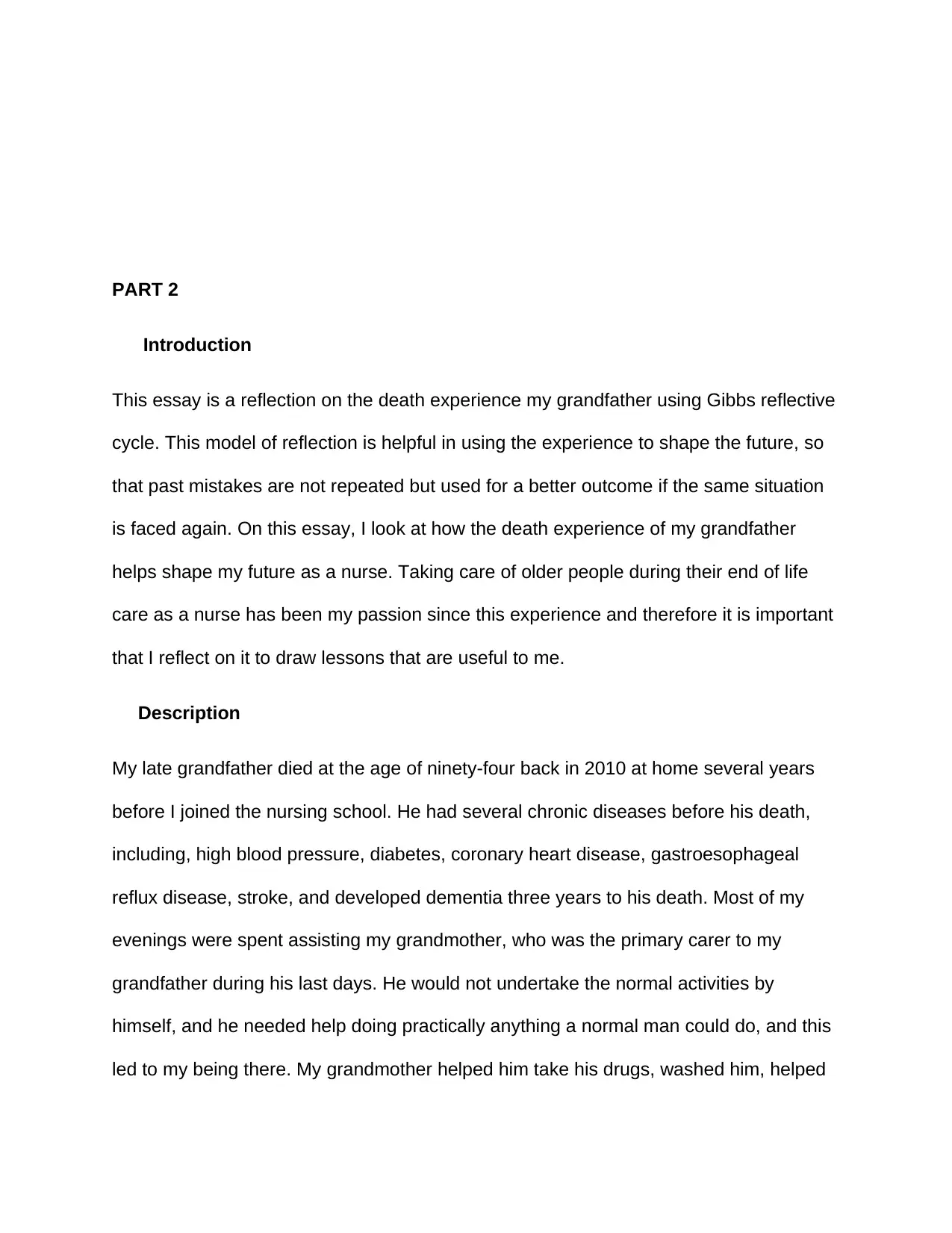
PART 2
Introduction
This essay is a reflection on the death experience my grandfather using Gibbs reflective
cycle. This model of reflection is helpful in using the experience to shape the future, so
that past mistakes are not repeated but used for a better outcome if the same situation
is faced again. On this essay, I look at how the death experience of my grandfather
helps shape my future as a nurse. Taking care of older people during their end of life
care as a nurse has been my passion since this experience and therefore it is important
that I reflect on it to draw lessons that are useful to me.
Description
My late grandfather died at the age of ninety-four back in 2010 at home several years
before I joined the nursing school. He had several chronic diseases before his death,
including, high blood pressure, diabetes, coronary heart disease, gastroesophageal
reflux disease, stroke, and developed dementia three years to his death. Most of my
evenings were spent assisting my grandmother, who was the primary carer to my
grandfather during his last days. He would not undertake the normal activities by
himself, and he needed help doing practically anything a normal man could do, and this
led to my being there. My grandmother helped him take his drugs, washed him, helped
Introduction
This essay is a reflection on the death experience my grandfather using Gibbs reflective
cycle. This model of reflection is helpful in using the experience to shape the future, so
that past mistakes are not repeated but used for a better outcome if the same situation
is faced again. On this essay, I look at how the death experience of my grandfather
helps shape my future as a nurse. Taking care of older people during their end of life
care as a nurse has been my passion since this experience and therefore it is important
that I reflect on it to draw lessons that are useful to me.
Description
My late grandfather died at the age of ninety-four back in 2010 at home several years
before I joined the nursing school. He had several chronic diseases before his death,
including, high blood pressure, diabetes, coronary heart disease, gastroesophageal
reflux disease, stroke, and developed dementia three years to his death. Most of my
evenings were spent assisting my grandmother, who was the primary carer to my
grandfather during his last days. He would not undertake the normal activities by
himself, and he needed help doing practically anything a normal man could do, and this
led to my being there. My grandmother helped him take his drugs, washed him, helped
⊘ This is a preview!⊘
Do you want full access?
Subscribe today to unlock all pages.

Trusted by 1+ million students worldwide
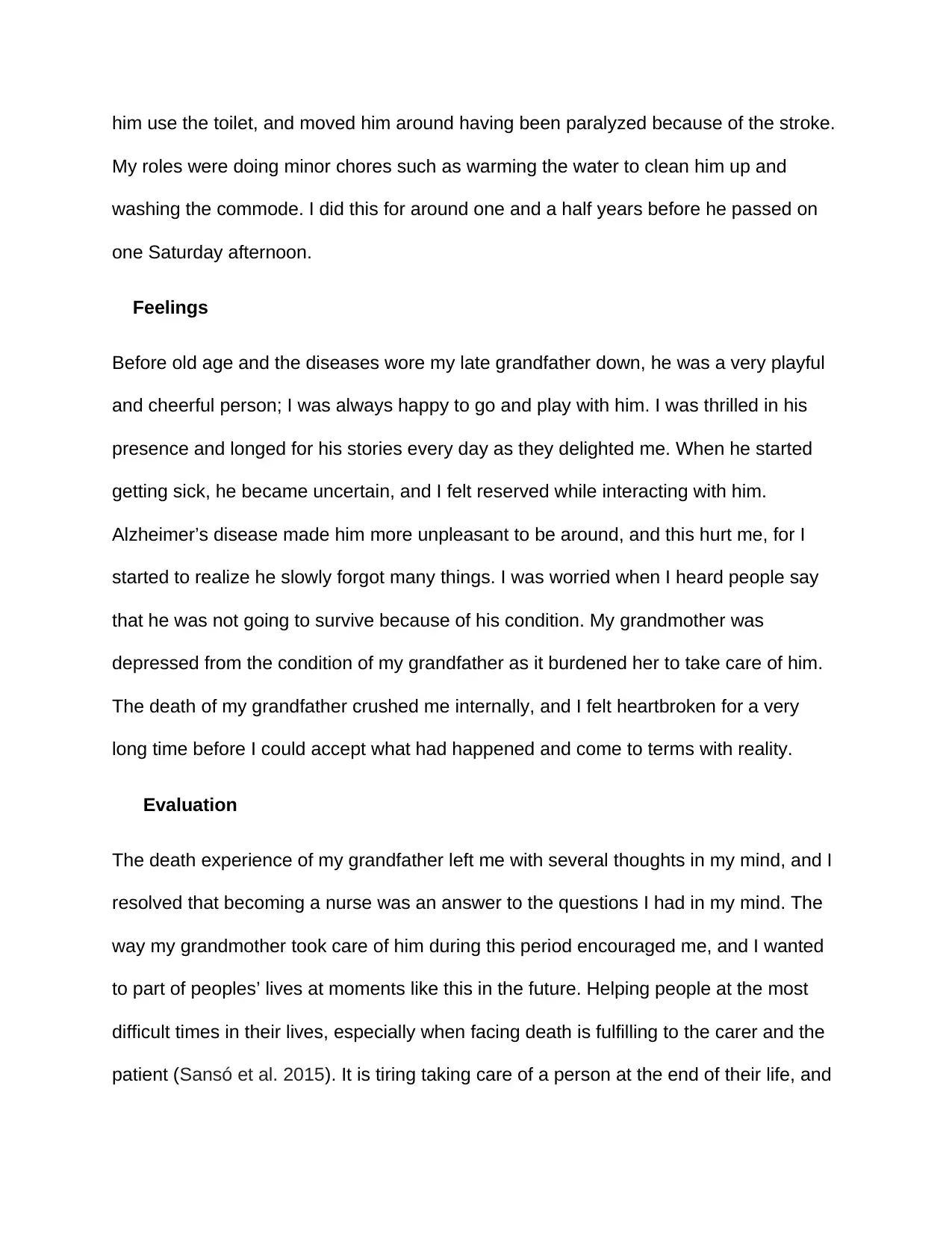
him use the toilet, and moved him around having been paralyzed because of the stroke.
My roles were doing minor chores such as warming the water to clean him up and
washing the commode. I did this for around one and a half years before he passed on
one Saturday afternoon.
Feelings
Before old age and the diseases wore my late grandfather down, he was a very playful
and cheerful person; I was always happy to go and play with him. I was thrilled in his
presence and longed for his stories every day as they delighted me. When he started
getting sick, he became uncertain, and I felt reserved while interacting with him.
Alzheimer’s disease made him more unpleasant to be around, and this hurt me, for I
started to realize he slowly forgot many things. I was worried when I heard people say
that he was not going to survive because of his condition. My grandmother was
depressed from the condition of my grandfather as it burdened her to take care of him.
The death of my grandfather crushed me internally, and I felt heartbroken for a very
long time before I could accept what had happened and come to terms with reality.
Evaluation
The death experience of my grandfather left me with several thoughts in my mind, and I
resolved that becoming a nurse was an answer to the questions I had in my mind. The
way my grandmother took care of him during this period encouraged me, and I wanted
to part of peoples’ lives at moments like this in the future. Helping people at the most
difficult times in their lives, especially when facing death is fulfilling to the carer and the
patient (Sansó et al. 2015). It is tiring taking care of a person at the end of their life, and
My roles were doing minor chores such as warming the water to clean him up and
washing the commode. I did this for around one and a half years before he passed on
one Saturday afternoon.
Feelings
Before old age and the diseases wore my late grandfather down, he was a very playful
and cheerful person; I was always happy to go and play with him. I was thrilled in his
presence and longed for his stories every day as they delighted me. When he started
getting sick, he became uncertain, and I felt reserved while interacting with him.
Alzheimer’s disease made him more unpleasant to be around, and this hurt me, for I
started to realize he slowly forgot many things. I was worried when I heard people say
that he was not going to survive because of his condition. My grandmother was
depressed from the condition of my grandfather as it burdened her to take care of him.
The death of my grandfather crushed me internally, and I felt heartbroken for a very
long time before I could accept what had happened and come to terms with reality.
Evaluation
The death experience of my grandfather left me with several thoughts in my mind, and I
resolved that becoming a nurse was an answer to the questions I had in my mind. The
way my grandmother took care of him during this period encouraged me, and I wanted
to part of peoples’ lives at moments like this in the future. Helping people at the most
difficult times in their lives, especially when facing death is fulfilling to the carer and the
patient (Sansó et al. 2015). It is tiring taking care of a person at the end of their life, and
Paraphrase This Document
Need a fresh take? Get an instant paraphrase of this document with our AI Paraphraser
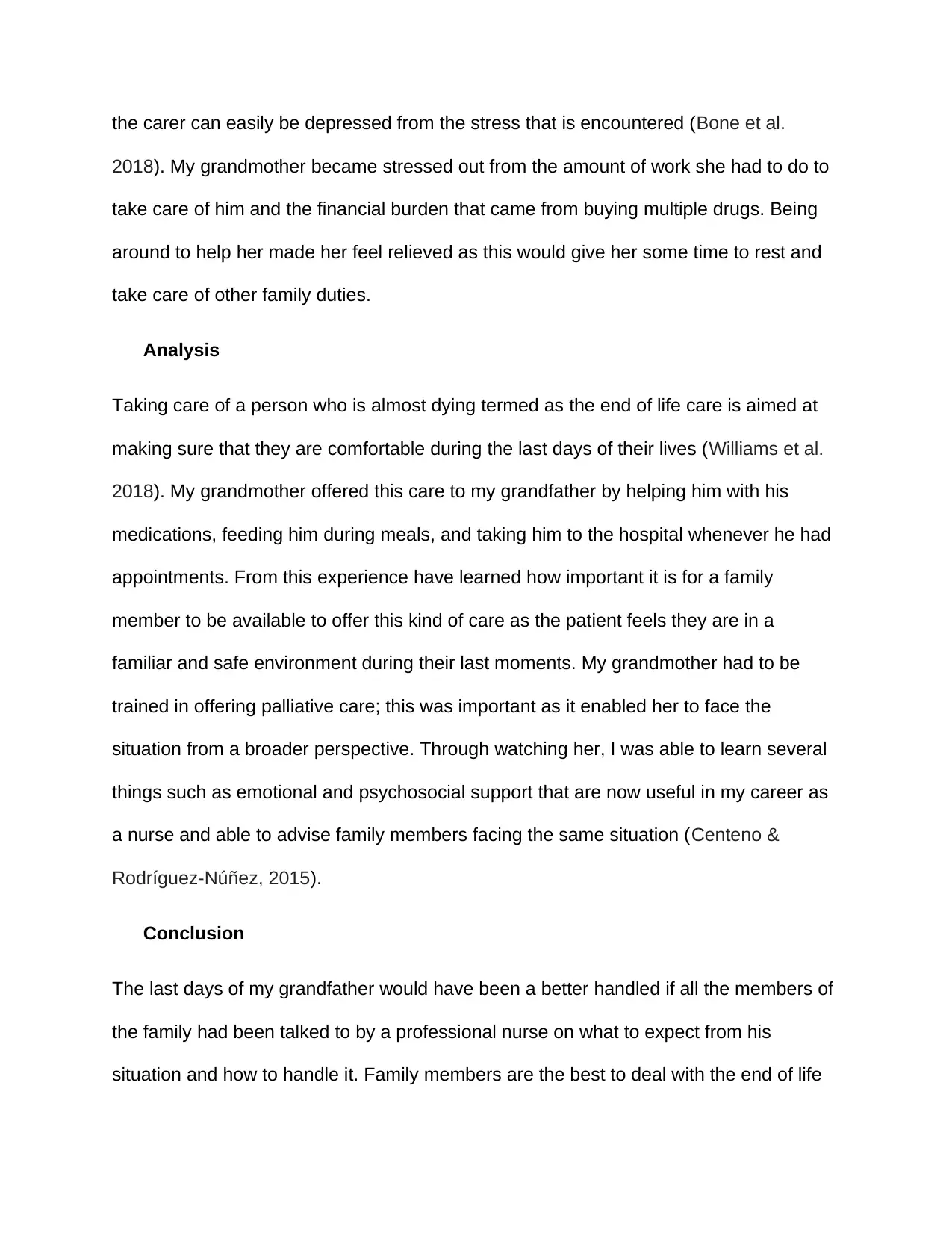
the carer can easily be depressed from the stress that is encountered (Bone et al.
2018). My grandmother became stressed out from the amount of work she had to do to
take care of him and the financial burden that came from buying multiple drugs. Being
around to help her made her feel relieved as this would give her some time to rest and
take care of other family duties.
Analysis
Taking care of a person who is almost dying termed as the end of life care is aimed at
making sure that they are comfortable during the last days of their lives (Williams et al.
2018). My grandmother offered this care to my grandfather by helping him with his
medications, feeding him during meals, and taking him to the hospital whenever he had
appointments. From this experience have learned how important it is for a family
member to be available to offer this kind of care as the patient feels they are in a
familiar and safe environment during their last moments. My grandmother had to be
trained in offering palliative care; this was important as it enabled her to face the
situation from a broader perspective. Through watching her, I was able to learn several
things such as emotional and psychosocial support that are now useful in my career as
a nurse and able to advise family members facing the same situation (Centeno &
Rodríguez-Núñez, 2015).
Conclusion
The last days of my grandfather would have been a better handled if all the members of
the family had been talked to by a professional nurse on what to expect from his
situation and how to handle it. Family members are the best to deal with the end of life
2018). My grandmother became stressed out from the amount of work she had to do to
take care of him and the financial burden that came from buying multiple drugs. Being
around to help her made her feel relieved as this would give her some time to rest and
take care of other family duties.
Analysis
Taking care of a person who is almost dying termed as the end of life care is aimed at
making sure that they are comfortable during the last days of their lives (Williams et al.
2018). My grandmother offered this care to my grandfather by helping him with his
medications, feeding him during meals, and taking him to the hospital whenever he had
appointments. From this experience have learned how important it is for a family
member to be available to offer this kind of care as the patient feels they are in a
familiar and safe environment during their last moments. My grandmother had to be
trained in offering palliative care; this was important as it enabled her to face the
situation from a broader perspective. Through watching her, I was able to learn several
things such as emotional and psychosocial support that are now useful in my career as
a nurse and able to advise family members facing the same situation (Centeno &
Rodríguez-Núñez, 2015).
Conclusion
The last days of my grandfather would have been a better handled if all the members of
the family had been talked to by a professional nurse on what to expect from his
situation and how to handle it. Family members are the best to deal with the end of life
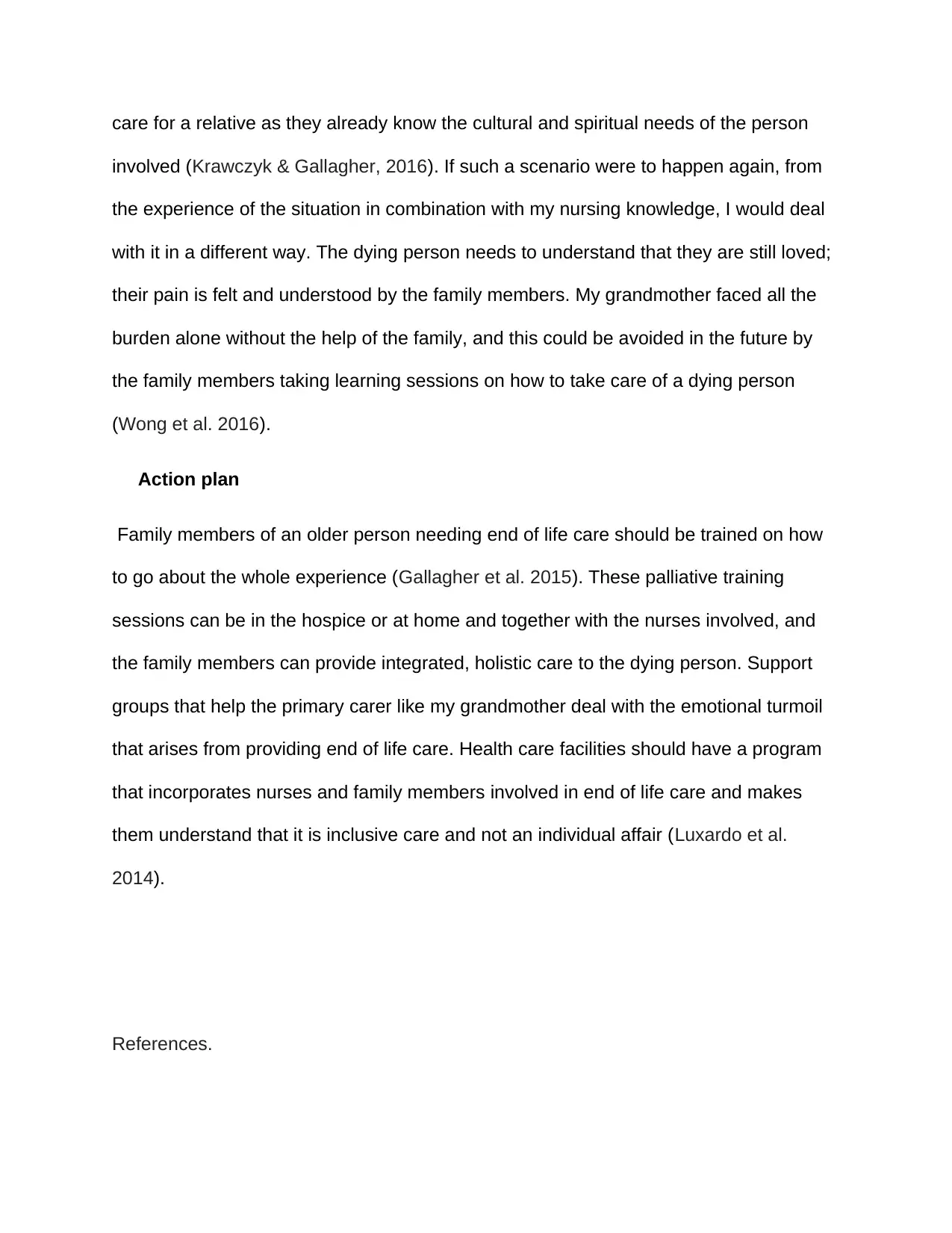
care for a relative as they already know the cultural and spiritual needs of the person
involved (Krawczyk & Gallagher, 2016). If such a scenario were to happen again, from
the experience of the situation in combination with my nursing knowledge, I would deal
with it in a different way. The dying person needs to understand that they are still loved;
their pain is felt and understood by the family members. My grandmother faced all the
burden alone without the help of the family, and this could be avoided in the future by
the family members taking learning sessions on how to take care of a dying person
(Wong et al. 2016).
Action plan
Family members of an older person needing end of life care should be trained on how
to go about the whole experience (Gallagher et al. 2015). These palliative training
sessions can be in the hospice or at home and together with the nurses involved, and
the family members can provide integrated, holistic care to the dying person. Support
groups that help the primary carer like my grandmother deal with the emotional turmoil
that arises from providing end of life care. Health care facilities should have a program
that incorporates nurses and family members involved in end of life care and makes
them understand that it is inclusive care and not an individual affair (Luxardo et al.
2014).
References.
involved (Krawczyk & Gallagher, 2016). If such a scenario were to happen again, from
the experience of the situation in combination with my nursing knowledge, I would deal
with it in a different way. The dying person needs to understand that they are still loved;
their pain is felt and understood by the family members. My grandmother faced all the
burden alone without the help of the family, and this could be avoided in the future by
the family members taking learning sessions on how to take care of a dying person
(Wong et al. 2016).
Action plan
Family members of an older person needing end of life care should be trained on how
to go about the whole experience (Gallagher et al. 2015). These palliative training
sessions can be in the hospice or at home and together with the nurses involved, and
the family members can provide integrated, holistic care to the dying person. Support
groups that help the primary carer like my grandmother deal with the emotional turmoil
that arises from providing end of life care. Health care facilities should have a program
that incorporates nurses and family members involved in end of life care and makes
them understand that it is inclusive care and not an individual affair (Luxardo et al.
2014).
References.
⊘ This is a preview!⊘
Do you want full access?
Subscribe today to unlock all pages.

Trusted by 1+ million students worldwide
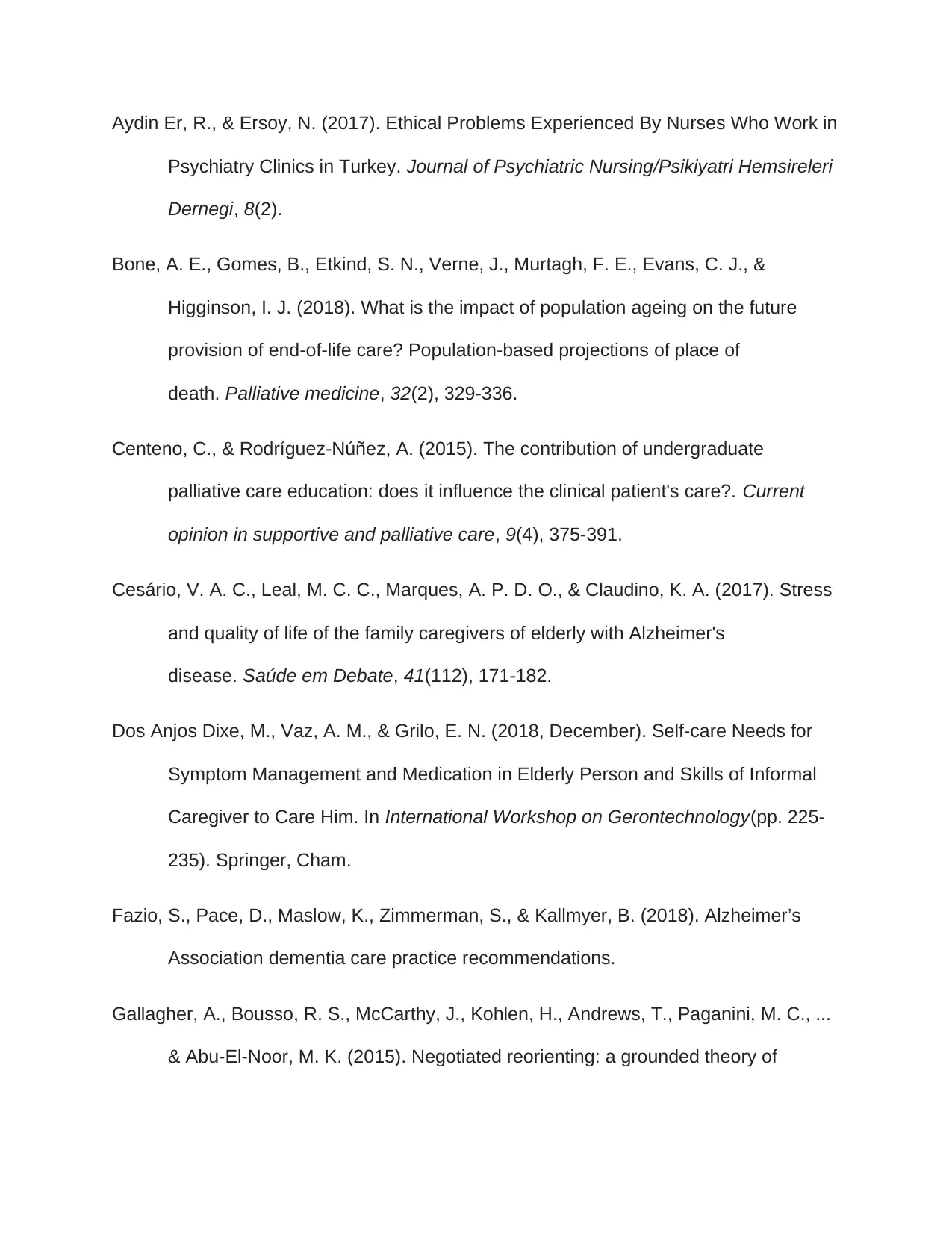
Aydin Er, R., & Ersoy, N. (2017). Ethical Problems Experienced By Nurses Who Work in
Psychiatry Clinics in Turkey. Journal of Psychiatric Nursing/Psikiyatri Hemsireleri
Dernegi, 8(2).
Bone, A. E., Gomes, B., Etkind, S. N., Verne, J., Murtagh, F. E., Evans, C. J., &
Higginson, I. J. (2018). What is the impact of population ageing on the future
provision of end-of-life care? Population-based projections of place of
death. Palliative medicine, 32(2), 329-336.
Centeno, C., & Rodríguez-Núñez, A. (2015). The contribution of undergraduate
palliative care education: does it influence the clinical patient's care?. Current
opinion in supportive and palliative care, 9(4), 375-391.
Cesário, V. A. C., Leal, M. C. C., Marques, A. P. D. O., & Claudino, K. A. (2017). Stress
and quality of life of the family caregivers of elderly with Alzheimer's
disease. Saúde em Debate, 41(112), 171-182.
Dos Anjos Dixe, M., Vaz, A. M., & Grilo, E. N. (2018, December). Self-care Needs for
Symptom Management and Medication in Elderly Person and Skills of Informal
Caregiver to Care Him. In International Workshop on Gerontechnology(pp. 225-
235). Springer, Cham.
Fazio, S., Pace, D., Maslow, K., Zimmerman, S., & Kallmyer, B. (2018). Alzheimer’s
Association dementia care practice recommendations.
Gallagher, A., Bousso, R. S., McCarthy, J., Kohlen, H., Andrews, T., Paganini, M. C., ...
& Abu-El-Noor, M. K. (2015). Negotiated reorienting: a grounded theory of
Psychiatry Clinics in Turkey. Journal of Psychiatric Nursing/Psikiyatri Hemsireleri
Dernegi, 8(2).
Bone, A. E., Gomes, B., Etkind, S. N., Verne, J., Murtagh, F. E., Evans, C. J., &
Higginson, I. J. (2018). What is the impact of population ageing on the future
provision of end-of-life care? Population-based projections of place of
death. Palliative medicine, 32(2), 329-336.
Centeno, C., & Rodríguez-Núñez, A. (2015). The contribution of undergraduate
palliative care education: does it influence the clinical patient's care?. Current
opinion in supportive and palliative care, 9(4), 375-391.
Cesário, V. A. C., Leal, M. C. C., Marques, A. P. D. O., & Claudino, K. A. (2017). Stress
and quality of life of the family caregivers of elderly with Alzheimer's
disease. Saúde em Debate, 41(112), 171-182.
Dos Anjos Dixe, M., Vaz, A. M., & Grilo, E. N. (2018, December). Self-care Needs for
Symptom Management and Medication in Elderly Person and Skills of Informal
Caregiver to Care Him. In International Workshop on Gerontechnology(pp. 225-
235). Springer, Cham.
Fazio, S., Pace, D., Maslow, K., Zimmerman, S., & Kallmyer, B. (2018). Alzheimer’s
Association dementia care practice recommendations.
Gallagher, A., Bousso, R. S., McCarthy, J., Kohlen, H., Andrews, T., Paganini, M. C., ...
& Abu-El-Noor, M. K. (2015). Negotiated reorienting: a grounded theory of
Paraphrase This Document
Need a fresh take? Get an instant paraphrase of this document with our AI Paraphraser
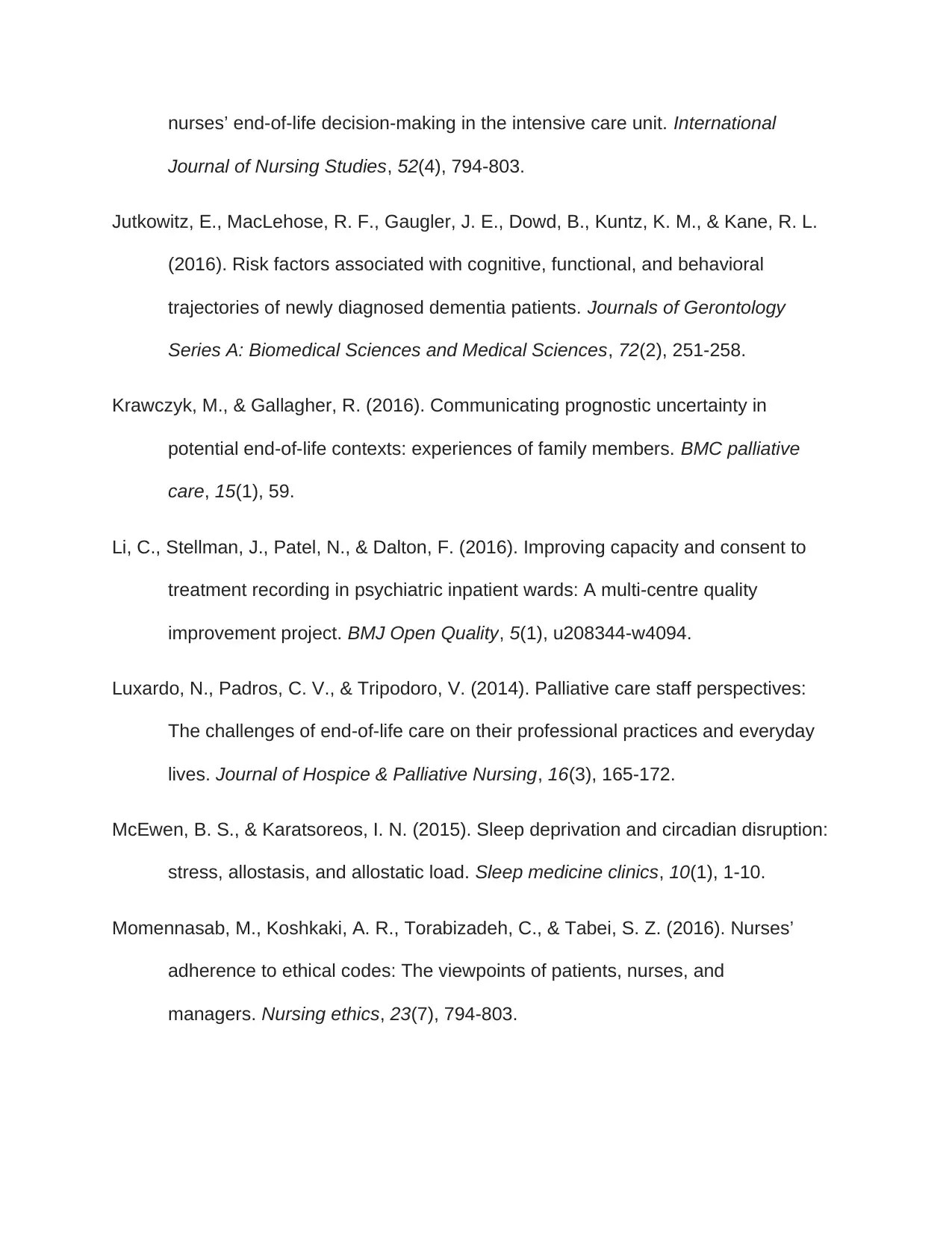
nurses’ end-of-life decision-making in the intensive care unit. International
Journal of Nursing Studies, 52(4), 794-803.
Jutkowitz, E., MacLehose, R. F., Gaugler, J. E., Dowd, B., Kuntz, K. M., & Kane, R. L.
(2016). Risk factors associated with cognitive, functional, and behavioral
trajectories of newly diagnosed dementia patients. Journals of Gerontology
Series A: Biomedical Sciences and Medical Sciences, 72(2), 251-258.
Krawczyk, M., & Gallagher, R. (2016). Communicating prognostic uncertainty in
potential end-of-life contexts: experiences of family members. BMC palliative
care, 15(1), 59.
Li, C., Stellman, J., Patel, N., & Dalton, F. (2016). Improving capacity and consent to
treatment recording in psychiatric inpatient wards: A multi-centre quality
improvement project. BMJ Open Quality, 5(1), u208344-w4094.
Luxardo, N., Padros, C. V., & Tripodoro, V. (2014). Palliative care staff perspectives:
The challenges of end-of-life care on their professional practices and everyday
lives. Journal of Hospice & Palliative Nursing, 16(3), 165-172.
McEwen, B. S., & Karatsoreos, I. N. (2015). Sleep deprivation and circadian disruption:
stress, allostasis, and allostatic load. Sleep medicine clinics, 10(1), 1-10.
Momennasab, M., Koshkaki, A. R., Torabizadeh, C., & Tabei, S. Z. (2016). Nurses’
adherence to ethical codes: The viewpoints of patients, nurses, and
managers. Nursing ethics, 23(7), 794-803.
Journal of Nursing Studies, 52(4), 794-803.
Jutkowitz, E., MacLehose, R. F., Gaugler, J. E., Dowd, B., Kuntz, K. M., & Kane, R. L.
(2016). Risk factors associated with cognitive, functional, and behavioral
trajectories of newly diagnosed dementia patients. Journals of Gerontology
Series A: Biomedical Sciences and Medical Sciences, 72(2), 251-258.
Krawczyk, M., & Gallagher, R. (2016). Communicating prognostic uncertainty in
potential end-of-life contexts: experiences of family members. BMC palliative
care, 15(1), 59.
Li, C., Stellman, J., Patel, N., & Dalton, F. (2016). Improving capacity and consent to
treatment recording in psychiatric inpatient wards: A multi-centre quality
improvement project. BMJ Open Quality, 5(1), u208344-w4094.
Luxardo, N., Padros, C. V., & Tripodoro, V. (2014). Palliative care staff perspectives:
The challenges of end-of-life care on their professional practices and everyday
lives. Journal of Hospice & Palliative Nursing, 16(3), 165-172.
McEwen, B. S., & Karatsoreos, I. N. (2015). Sleep deprivation and circadian disruption:
stress, allostasis, and allostatic load. Sleep medicine clinics, 10(1), 1-10.
Momennasab, M., Koshkaki, A. R., Torabizadeh, C., & Tabei, S. Z. (2016). Nurses’
adherence to ethical codes: The viewpoints of patients, nurses, and
managers. Nursing ethics, 23(7), 794-803.
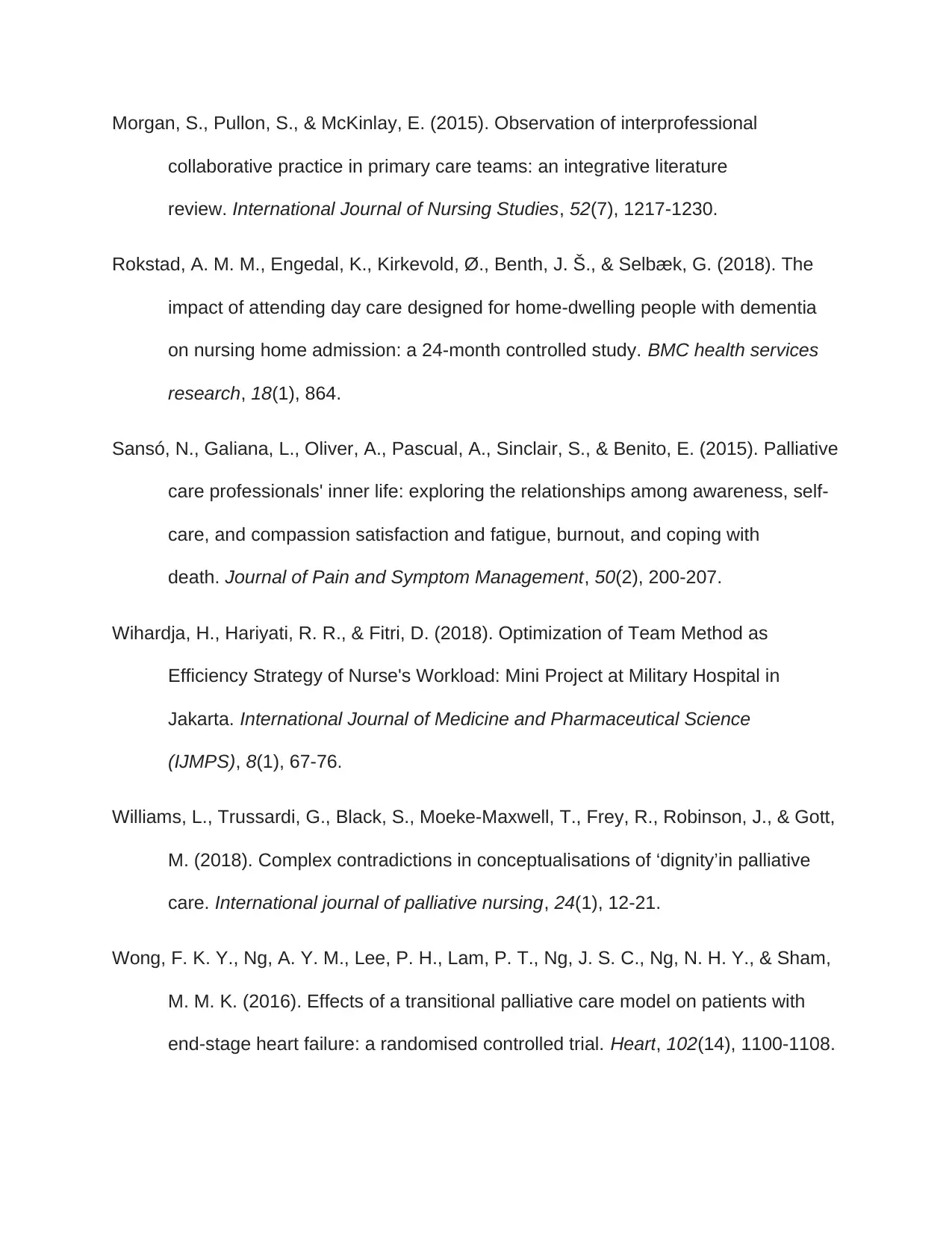
Morgan, S., Pullon, S., & McKinlay, E. (2015). Observation of interprofessional
collaborative practice in primary care teams: an integrative literature
review. International Journal of Nursing Studies, 52(7), 1217-1230.
Rokstad, A. M. M., Engedal, K., Kirkevold, Ø., Benth, J. Š., & Selbæk, G. (2018). The
impact of attending day care designed for home-dwelling people with dementia
on nursing home admission: a 24-month controlled study. BMC health services
research, 18(1), 864.
Sansó, N., Galiana, L., Oliver, A., Pascual, A., Sinclair, S., & Benito, E. (2015). Palliative
care professionals' inner life: exploring the relationships among awareness, self-
care, and compassion satisfaction and fatigue, burnout, and coping with
death. Journal of Pain and Symptom Management, 50(2), 200-207.
Wihardja, H., Hariyati, R. R., & Fitri, D. (2018). Optimization of Team Method as
Efficiency Strategy of Nurse's Workload: Mini Project at Military Hospital in
Jakarta. International Journal of Medicine and Pharmaceutical Science
(IJMPS), 8(1), 67-76.
Williams, L., Trussardi, G., Black, S., Moeke-Maxwell, T., Frey, R., Robinson, J., & Gott,
M. (2018). Complex contradictions in conceptualisations of ‘dignity’in palliative
care. International journal of palliative nursing, 24(1), 12-21.
Wong, F. K. Y., Ng, A. Y. M., Lee, P. H., Lam, P. T., Ng, J. S. C., Ng, N. H. Y., & Sham,
M. M. K. (2016). Effects of a transitional palliative care model on patients with
end-stage heart failure: a randomised controlled trial. Heart, 102(14), 1100-1108.
collaborative practice in primary care teams: an integrative literature
review. International Journal of Nursing Studies, 52(7), 1217-1230.
Rokstad, A. M. M., Engedal, K., Kirkevold, Ø., Benth, J. Š., & Selbæk, G. (2018). The
impact of attending day care designed for home-dwelling people with dementia
on nursing home admission: a 24-month controlled study. BMC health services
research, 18(1), 864.
Sansó, N., Galiana, L., Oliver, A., Pascual, A., Sinclair, S., & Benito, E. (2015). Palliative
care professionals' inner life: exploring the relationships among awareness, self-
care, and compassion satisfaction and fatigue, burnout, and coping with
death. Journal of Pain and Symptom Management, 50(2), 200-207.
Wihardja, H., Hariyati, R. R., & Fitri, D. (2018). Optimization of Team Method as
Efficiency Strategy of Nurse's Workload: Mini Project at Military Hospital in
Jakarta. International Journal of Medicine and Pharmaceutical Science
(IJMPS), 8(1), 67-76.
Williams, L., Trussardi, G., Black, S., Moeke-Maxwell, T., Frey, R., Robinson, J., & Gott,
M. (2018). Complex contradictions in conceptualisations of ‘dignity’in palliative
care. International journal of palliative nursing, 24(1), 12-21.
Wong, F. K. Y., Ng, A. Y. M., Lee, P. H., Lam, P. T., Ng, J. S. C., Ng, N. H. Y., & Sham,
M. M. K. (2016). Effects of a transitional palliative care model on patients with
end-stage heart failure: a randomised controlled trial. Heart, 102(14), 1100-1108.
⊘ This is a preview!⊘
Do you want full access?
Subscribe today to unlock all pages.

Trusted by 1+ million students worldwide
1 out of 13
Related Documents
Your All-in-One AI-Powered Toolkit for Academic Success.
+13062052269
info@desklib.com
Available 24*7 on WhatsApp / Email
![[object Object]](/_next/static/media/star-bottom.7253800d.svg)
Unlock your academic potential
Copyright © 2020–2026 A2Z Services. All Rights Reserved. Developed and managed by ZUCOL.





